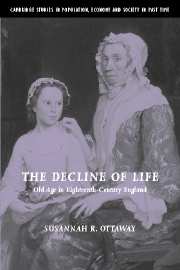Book contents
- Frontmatter
- Contents
- List of figures
- List of tables
- Acknowledgments
- List of abbreviations
- Introduction: Old age in eighteenth-century England: no “golden age of aging”
- 1 Who was “old” in eighteenth-century England?
- 2 The activities of the “helmsman”: self-reliance, work, and community expectations of the elderly
- 3 “The comforts of a private fire-side”
- 4 Independent but not alone: family ties for the elderly
- 5 Community assistance to the aged under the Old Poor Law
- 6 Continuity and change in community assistance to the elderly over the eighteenth century
- 7 Within workhouse walls: indoor relief for the elderly
- Conclusion: Old age as a useful category of historical analysis
- Bibliography
- Index
Conclusion: Old age as a useful category of historical analysis
Published online by Cambridge University Press: 15 December 2009
- Frontmatter
- Contents
- List of figures
- List of tables
- Acknowledgments
- List of abbreviations
- Introduction: Old age in eighteenth-century England: no “golden age of aging”
- 1 Who was “old” in eighteenth-century England?
- 2 The activities of the “helmsman”: self-reliance, work, and community expectations of the elderly
- 3 “The comforts of a private fire-side”
- 4 Independent but not alone: family ties for the elderly
- 5 Community assistance to the aged under the Old Poor Law
- 6 Continuity and change in community assistance to the elderly over the eighteenth century
- 7 Within workhouse walls: indoor relief for the elderly
- Conclusion: Old age as a useful category of historical analysis
- Bibliography
- Index
Summary
In 1995, Peter Laslett described the history of old age as “necessary knowledge,” and in a certain light it seemed so, as academic conferences on “life, death and the elderly” were oversubscribed, and important new monographs appeared on old age in such disparate times and places as medieval Europe and modern India. But a closer look into the field reveals that there has been relatively little published on old age in European history since Peter Stearns commented in 1982 on the “shockingly untended” status of the field. In fact, a survey of the literature shows that between 1970 and 2001, there were only thirty-four books (about evenly divided between monographs and collections of essays) published specifically on old age in European history, and only twenty-two of these are available in English. This is in marked contrast to similar areas of study such as the history of childhood, where literally hundreds of books and articles have appeared in the decades since Philippe Ariès's seminal work Centuries of Childhood. There are similar hints of the relative marginalization of the history of old age (as of humanistic gerontology in general) within gerontology, as W.A. Achenbaum has recently noted. Why, given the clear sense of importance attached to this field by those who created it, or responded to it in the 1980s and 1990s, has the history of old age generated so small a body of work?
- Type
- Chapter
- Information
- The Decline of LifeOld Age in Eighteenth-Century England, pp. 277 - 283Publisher: Cambridge University PressPrint publication year: 2004

